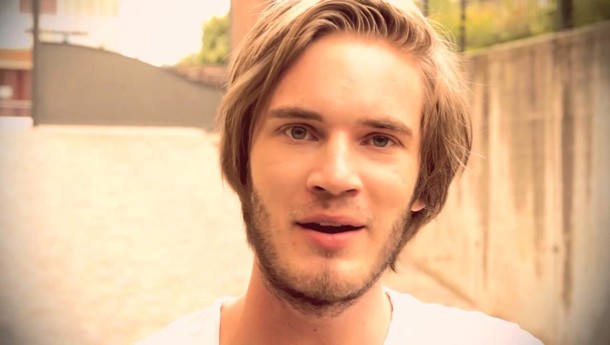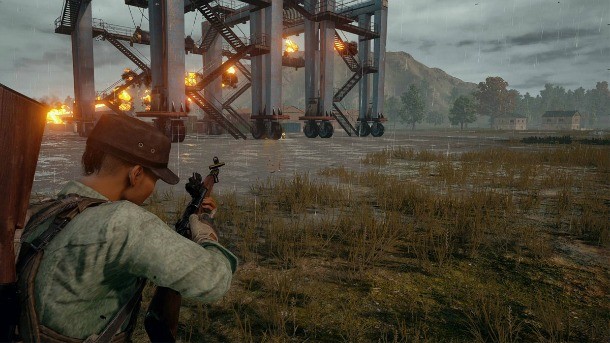Please support Game Informer. Print magazine subscriptions are less than $2 per issue
Opinion: We Need To Talk About PewDiePie

Yesterday, Felix Kjellberg, aka PewDiePie, uttered a racial slur while streaming PlayerUnknown's Battlegrounds. We wrote a news piece about it. The responses to the article were a mixed bag. There were plenty of readers who were appalled and disturbed by the instance. However, in the past 24 hours, supporters have come to Kjellberg's defense, saying that he's not a racist, that he said what he said in a "heated moment of gaming," that he's a shock jock, that the media is out to smear his good image, that people who play Call of Duty say these things all of the time. Perhaps the most disheartening response was that Felix Kjellberg spouting a racial slur was not news in the slightest.
We're Game Informer. We are not a gossip rag. When we write the news, we do not deal in hypotheticals, and we do not take for granted the sacredness of facts in an age where people distrust the media at every turn. Kjellberg, the most popular YouTuber on the planet, was streaming one of the most popular video games and called an opponent a "N-----" (for a nuanced look at why that word is unacceptable, head here). Afterwords, he immediately 'corrected' himself by saying "a**hole," demonstrating that he's aware of the slur's use as a pejorative. This is a fact. There is video evidence you can watch for yourself right here. Now, admittedly just because it's fact doesn't make it news, so what does make it news?
Gaming's problem with toxicity is not a secret. Anytime you load up Counter-Strike, Overwatch, DOTA 2, PUBG, Call of Duty, you're opening yourself up to the possibility you will hear insults, racial slurs, and other bigoted remarks. Gaming should, by its nature, be an inclusive experience where people feel safe to experience the richness of this medium, whatever form it takes, without having their ethnicity attacked. This is a problem in our backyard, one that we've cultivated over two decades by letting trash talk fester into something toxic. It's a multipronged failure. A failure on the part of developers to create sturdy systems that punish harmful players for their remarks. It's a failure on the part of gamers to step up during multiplayer matches, in forums, in public places when someone screams racial slurs because they're angry or having "a heated moment." And it is also, let's be very clear about this, a failure on the part of major outlets like ourselves to work toward making video games a place where everyone feels welcome.

Kjellberg has an audience of over 57 million subscribers. He is, by all definitions, a public figure.
We wrote an article about Kjellberg not to smear him, not for clicks, not to jump on some controversy. We wrote the piece because it is a fundamental chapter in a huge story that's been playing out over decades, a story that's about who gets to play games without fear of being attacked for their identity. The reason Kjellberg saying that slur is news when your average Call of Duty player saying it isn't, is because Kjellberg wields an influence that most people do not have. You may find yourself balking at the idea that a YouTuber gets to shape culture, but that's how reinforcement of ideas happen, especially when you cater to an audience that large, undoubtedly comprised of young people. Kjellberg's slur is news because it reinforces gaming's toxicity problem in a big way. Despite Kjellberg's insistence that "he never set out to be a role model," he is. You can't play to that large of an audience without sending a message about who you are, what you value, and having that audience grapple with that message.
The world's biggest YouTuber and an idol to literally millions people saying a slur is news and it's more than news, too. It's a conversation everyone everywhere in this industry needs to keep having. At Game Informer, we believe games are for everyone and we will continue to unapologetically cover news and write stories that deal with the struggle of making that a reality because the truth is, no matter how bad you want to believe otherwise, that prejudice seeps into the communities of the games we all love so much, marring an experience that should be universal for so many people. We sincerely hope that this experience prompts Kjellberg to not only apologize, but use his influence to help create an environment where people of color and other persecuted minorities feel safe playing video games.
Gaming is, of course, not alone in toxicity. In 2013, NFL wide receiver Riley Cooper said at a concert "I'll fight every n*****" in this place" and was taken to task for it by the public and eventually fined by his team. The same goes for Michael Richards, who played Kramer on Seinfeld and screamed racist remarks at audience members during a standup routine. Richard was banned from the Laugh Factory, where he delivered the tirade. If other communities around the world can fight back against toxic, racist behavior, then the gaming community should do its part as well. All of this is bigger than a YouTuber or some average player slinging slurs. It's about a culture, both in and out of video games, with a toxicity problem that often seems immense and indomitable. But that's not an excuse to not try, to call out unacceptable behavior when you see it happen, to take people aside and try your best to explain to them why that kind of toxicity can affect someone's enjoyment of a game.
In the end, there are no more excuses.










